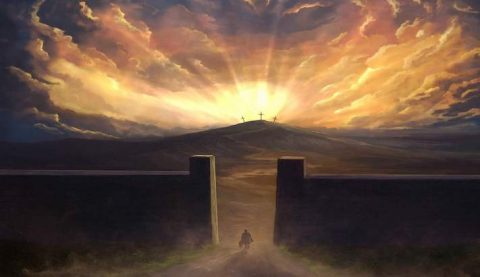"Unconditional Love"
April 1, 2022 | Jim Micheff | President

Recently I had an up-close experience with Covid. My symptoms were mild, but I did have a low-grade fever for 14 days. During that time, due to cloudy thinking caused by the fever, all interest in anything was gone. I had no desire to eat, read, watch, or even communicate. I was existing, but without purpose. What gives life meaning? When God created us, He had a definite plan and purpose for humanity.
In his younger years, Solomon, known for his wisdom, believed that the purpose of life was to enjoy all its benefits. He put all his energy into obtaining everything he wanted. What he discovered, however, is that people change as they age. Wrinkles, hair loss, muscle tone, flexibility – these all alter appearance. Talents and skills diminish over time, too. The saying, “The older I get, the better I used to be,” becomes a reality. All of these can affect the way we experience happiness.
In his closing years, Solomon confessed that self-focus not only failed to provide happiness; it drained him of meaning for living. He realized those things did not bring fulfillment unless used to bless others. His pursuit in pleasing self inhibited him from fulfilling the purpose of life God ordained – loving service for others.
The only motivation for life that is lasting is love for God. Love doesn’t exist apart from God. Love gives purpose and meaning to life. Without purpose, life is an endless pursuit of boring and meaningless activity.
God has been revealing His love to us systematically from the very beginning. Satan has been misapplying and confusing every good thing God does so that the truth about God and His love is either hidden or maligned. But God’s love cannot be suppressed forever and at some point, it will shine through.
God is self-sustaining. He isn’t dependent on anyone or thing. He isn’t trying to acquire or get something from His creation. He supplies their needs, not the other way around. He doesn’t take advantage of His creatures. His sole desire is to share His love with them. The very nature of love does not focus on self but others.
“My people are destroyed for a lack of knowledge” (Hosea 4:6). Knowledge of what?

God reveals His unconditional love to us in many ways. He uniquely describes His love by identifying with human passion and a real personal experience in the book of Hosea. The greatest, most powerful of all human relationships exists within marriage. This is the most intimate relationship two humans can have. It provides the opportunity for the strongest of all emotions. It also provides the opportunity for the deepest sorrow – rejection of love. God uses a real-life marriage relationship to help humans understand their relationship with Him.
As the story begins, the Israelites consistently ignored and rejected God’s love. They didn’t recognize God as the source of their blessings and misinterpreted the things He did for them. They mistakenly thought they were responsible for all the good things of life.
The Lord gave Prophet Hosea some unusual instructions. “Go, take yourself a wife of harlotry
and children of harlotry, for the land has committed great harlotry by departing from the LORD” (Hosea 1:2, NKJV).
Hosea’s wife, Gomer, may not have been promiscuous at the time of their marriage but she had a weakness in that area. She had wandering eyes, looking for attention and recognition that would add perceived value to her life.
The Bible identifies Hosea as the father of their first child but doesn’t specifically say the next two children are his. This leaves the possibility that she was unfaithful, and the children were fathered by someone else, as is suggested in Hosea 1:2, 9.
The scripture says she bore him a son. In the Bible, names convey character traits or important deeper meanings. God wanted to relay a special message so He had Hosea call his son Jezreel, saying, “I will avenge the bloodshed of Jezreel on the house of Jehu.” Jehu had carried out God’s command to exterminate Ahab’s family but not because of love or zeal for God. He was motivated by a selfish desire to establish his own kingdom. God sent the message that He will judge the motive behind the action. God warned them – as well as us – that because their hearts were far from Him, just going through the motions of religious ceremony was worthless.
Again, the Scripture says she conceived and bore a daughter. God had Hosea name her Lo-Ruhamah (No-Mercy). “I will no longer have mercy on Israel.” The message was a warning that the door of opportunity to accept God’s offer to return would soon close.
After Lo-Ruhamah was weaned, Gomer conceived and born a son. God named him Lo-Ammi. “You are not my people, and I will not be your God.” Through this name, God acknowledged they had rejected Him. That isn’t a common name to be sure, but I’ve met a young man named Lo-Ammi. I asked him how his parents gave him that name. He was eager to share that even though the name means Not-My-People there was a promise attached to it. God promised to accept as His children all who turn to Him.
Gomer was discontented and more interested in meeting her own emotional and material desires than being a wife and mother. When she married Hosea, she pledged herself to him but because she loved herself more than her husband, she was willing to exchange everything she had, including her body and affection to get what she wanted. This eventually caused her to leave Hosea altogether.
“Ephraim is joined to his idols, let him alone” (Hosea 4:17). What could Hosea do? What could God do? Love doesn’t force!
Gomer had taken her husband’s unconditional love for granted and took advantage of the opportunities to pursue her own dreams. In time, she was also taken advantage of by others, rejected by her lovers, and finally reduced to poverty and slavery. Her self-respect and dignity were gone. Covered in shame and disgrace, she was considered worthless. This is a description of our carnal nature. We are slaves to sin, chained to it by a power we cannot break.
“How can I give you up, Ephraim? How can I hand you over, Israel? ...My heart churns within Me; My sympathy is stirred” (Hosea 11:8).
God instructed Hosea to buy Gomer back and love her as he did before. This was impossible for Hosea to do on his own, but with God all things are possible. God loved Gomer through Hosea. Following God’s direction, Hosea bought her back but did not try to force Gomer to love him. He gave her time to decide if she would choose to willingly give him her love and affection, but he promised to love, provide, and protect and care for her as he had before. They would not be able to experience intimacy as husband and wife unless she fully committed her love and loyalty to Hosea.

To know God is to love Him. Satan does not want us to experience the love of God. He creates two ditches on both sides of love...one so wide that anything goes and is accepted—all spirit and no law. The other is so narrow it suffocates the love of God with legalism and self-righteousness—all law and no spirit. God’s love is balanced between the spirit of the law and the letter of the law. Love becomes the motivation behind the action. God’s unconditional love is the only motivating power that enables us to willingly submit our affection and loyalty to the Master.
“Yes, I have loved you with an everlasting love; Therefore, with lovingkindness I have drawn you” (Jer. 31:3).
God picks us up from the scrap heap of life to restore value in us with His love. The only thing God desires in return is our affection, love, and loyalty. The Bible doesn’t say, but the implication is that in the end Gomer chose to respond to Hosea’s love. Just as Hosea gave Gomer time to choose, God gives us time.
After Paul experienced the unconditional love of God, he wrote these encouraging words directed to all who responded to God’s invitation for reconciliation:
“For this reason I bow my knees to the Father of our Lord Jesus Christ, from whom the whole family in heaven and earth is named, that He would grant you, to be strengthened with might through His Spirit in the inner man, that Christ may dwell in your hearts through faith; that you, being rooted and grounded in love, may be able to comprehend with all the saints what is the width and length and depth and height – to know (experience) the love of Christ which passes knowledge; that you may be filled with all the fullness of God (love). Now to Him who is able to do exceedingly abundantly above all that we ask or think, according to the power (love) that works in us, to Him be glory in the church by Christ Jesus to all generations, forever and ever, Amen.” (Eph. 3:14-22, emphasis supplied).
